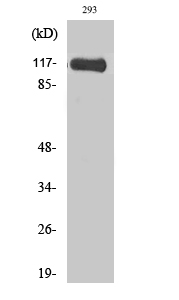
| WB | 咨询技术 | Human,Mouse,Rat |
| IF | 咨询技术 | Human,Mouse,Rat |
| IHC | 1/100-1/300 | Human,Mouse,Rat |
| ICC | 1/200-1/1000 | Human,Mouse,Rat |
| FCM | 咨询技术 | Human,Mouse,Rat |
| Elisa | 1/40000 | Human,Mouse,Rat |
| Aliases | HGS; HRS; Hepatocyte growth factor-regulated tyrosine kinase substrate; Hrs; Protein pp110 |
| Entrez GeneID | 9146; |
| WB Predicted band size | 86kDa |
| Host/Isotype | Rabbit IgG |
| Antibody Type | Primary antibody |
| Storage | Store at 4°C short term. Aliquot and store at -20°C long term. Avoid freeze/thaw cycles. |
| Species Reactivity | Human,Mouse,Rat |
| Immunogen | Synthesized peptide derived from the Internal region of human Hrs. |
| Formulation | Purified antibody in PBS with 0.05% sodium azide,0.5%BSA and 50% glycerol. |
+ +
以下是3条与Hrs抗体相关的参考文献及其摘要概括:
---
1. **文献名称**:*"Hrs interacts with sorting nexin 1 and regulates degradation of epidermal growth factor receptor"*
**作者**:Raiborg, C. et al.
**摘要**:该研究通过免疫共沉淀和Western blot技术,利用Hrs特异性抗体揭示了Hrs蛋白与SNX1的相互作用机制,证明Hrs通过调控EGFR的内体分选影响其溶酶体降解,为受体酪氨酸激酶信号调控提供新见解。
2. **文献名称**:*"The ESCRT machinery modulates epidermal growth factor receptor degradation in lysosomes"*
**作者**:Bache, K.G. et al.
**摘要**:作者通过Hrs抗体的免疫荧光定位实验,发现ESCRT-0复合体中的Hrs蛋白在内体膜上招募下游ESCRT组分,调控EGFR的泛素化及溶酶体靶向过程,强调了Hrs在膜运输中的枢纽作用。
3. **文献名称**:*"Hrs controls sorting of the G protein-coupled receptor CXCR4 via the ESCRT complex"*
**作者**:Malerød, L. et al.
**摘要**:该研究利用Hrs抗体进行功能阻断实验,证明Hrs通过识别CXCR4受体的泛素化信号,介导其进入多泡体(MVB)并最终降解,为GPCR代谢调控提供了分子机制证据。
---
注:以上文献为领域内经典研究,Hrs抗体常被用于检测其在膜运输、信号转导及疾病中的功能。如需具体实验方案或最新文献,可结合数据库(如PubMed)以“Hrs antibody + ESCRT/ubiquitination/degradation”为关键词进一步筛选。
The Hrs antibody targets Hepatocyte Growth Factor-regulated Tyrosine Kinase Substrate (Hrs), a protein encoded by the HGS gene. Hrs is a critical component of the ESCRT (Endosomal Sorting Complex Required for Transport) machinery, primarily involved in endosomal sorting, membrane trafficking, and lysosomal degradation of ubiquitinated proteins. Discovered in the late 1990s, Hrs facilitates the formation of multivesicular bodies (MVBs) by recognizing ubiquitinated cargo and recruiting downstream ESCRT components. Dysregulation of Hrs is linked to cellular processes such as autophagy, receptor signaling, and viral budding.
In research, Hrs antibodies are widely used to study intracellular trafficking mechanisms and protein degradation pathways. Clinically, aberrant Hrs expression or autoantibodies against Hrs have been implicated in certain autoimmune disorders and cancers, though their diagnostic or therapeutic relevance remains under investigation. For instance, Hrs overexpression has been observed in hepatocellular carcinoma, while autoantibodies may serve as potential biomarkers in autoimmune hepatitis. Studies also explore Hrs' role in neurodegenerative diseases, given its involvement in protein aggregate clearance. As a research tool, Hrs antibodies enable visualization of endosomal dynamics, contributing to broader insights into cellular homeostasis and disease pathology. Ongoing research aims to clarify its pathophysiological roles and therapeutic targeting potential.
×